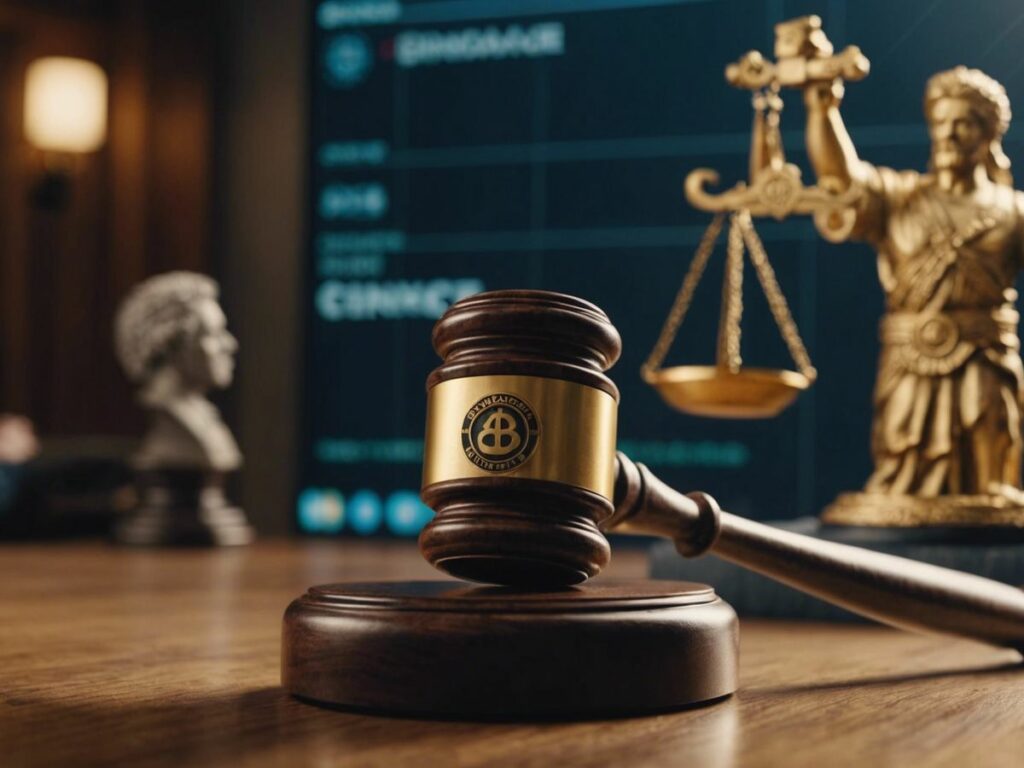In 2023, the U.S. Securities and Exchange Commission (SEC) initiated lawsuits against the world’s three largest crypto exchanges – Binance, Coinbase, and Kraken – marking a significant shift for the previously unregulated crypto industry. These legal actions have raised questions about the future of cryptocurrencies and the regulatory landscape they will operate in.
Key Takeaways
- The SEC has filed lawsuits against Binance, Coinbase, and Kraken, accusing them of various regulatory violations.
- The lawsuits have significant implications for the classification of certain cryptocurrencies as securities.
- The crypto market has shown resilience despite the legal challenges.
SEC vs. Binance: Accusations and Developments
On June 5, 2023, the SEC filed a lawsuit against Binance, accusing the exchange of several violations, including running an unregistered exchange, selling Binance-owned cryptos BNB and BUSD, and using customer funds for its own interests. The SEC is also investigating whether Binance used U.S. customer funds similarly to the now-defunct FTX exchange.
Binance has responded by filing a motion to dismiss the lawsuit. The case is expected to extend into 2024, with Binance agreeing to pay a $4.3 billion fine to settle charges from other U.S. regulatory bodies. This settlement led to the resignation of Binance CEO Changpeng Zhao, with Richard Teng stepping in as the new CEO.
SEC vs. Kraken: Commingling Complaints
On November 20, 2023, the SEC filed a complaint against Kraken, accusing the exchange of operating as an unregistered securities exchange and commingling customer funds for operating expenses. Kraken has denied the charges and intends to defend itself in court. This is not the first time Kraken has faced legal action from the SEC; earlier in 2023, the exchange paid $30 million in fines to settle charges related to its staking program.
SEC vs. Coinbase: Compliance Issues
A day after filing the lawsuit against Binance, the SEC charged Coinbase with operating as an unregistered securities exchange and broker. The SEC also took issue with Coinbase’s staking-as-a-service program and its marketing campaigns. Coinbase has responded by attempting to register parts of its business with the SEC, but claims that the regulator has not cooperated. The case is expected to continue into 2024.
Market Reactions and Future Implications
Despite the lawsuits, the cryptocurrency market has shown resilience. Bitcoin and Ether quickly rebounded from initial sell-offs, although other cryptocurrencies identified as securities by the SEC, such as BNB, ADA, and SOL, faced selling pressure. Data firm Nansen reported significant withdrawals from Binance following the SEC lawsuit and subsequent fine.
The Road Ahead for the Crypto Industry
The lawsuits have highlighted the need for regulatory clarity in the crypto industry. Experts suggest that U.S. centralized exchanges may eventually only list Bitcoin and Ether, while other tokens could be traded on decentralized exchanges. There is also a preference within the industry for cryptocurrencies to be regulated by the U.S. Commodity Futures Trading Commission (CFTC) rather than the SEC.
Understanding the SEC’s Role
The SEC aims to regulate cryptocurrencies similarly to how it regulates the stock market, ensuring that companies provide truthful information and protect investors. Established in 1934, the SEC has a long history of regulating financial markets to prevent fraud and protect investors.
What Is Binance?
Binance is the world’s largest crypto exchange, founded by Changpeng Zhao. It operates as Binance.US in the U.S. and has its own cryptocurrency, BNB.
What Is Coinbase?
Coinbase, founded in 2012 by Brian Armstrong, is the largest crypto exchange in the U.S. by trade volume. Unlike Binance, Coinbase does not have its own token but has announced plans to launch a blockchain network called Base.
What Is Kraken?
Kraken, one of the oldest crypto exchanges, was co-founded in 2011 by Jesse Powell and Thanh Luu. It offers a wide range of cryptocurrencies and supports transactions in multiple fiat currencies.
Conclusion: The Inevitable Regulation
Cryptocurrency regulation appears inevitable, but there is hope that the U.S. will provide a fair regulatory environment. With better clarity, crypto exchanges are expected to become stronger and more secure, benefiting the entire industry.
Sources
- SEC vs Binance, Coinbase, Kraken Lawsuits Usher Tough New Era, Techopedia.
- Binance Lawsuit: US SEC Files Coinbase Insider Case as Supplemental Authority in Binance Suit, CoinGape.
- Binance, Coinbase head to court; the SEC labels 67 crypto-securities, Cointelegraph.
- Full List of Cryptos Named Securities in SEC Lawsuits, BeInCrypto.
